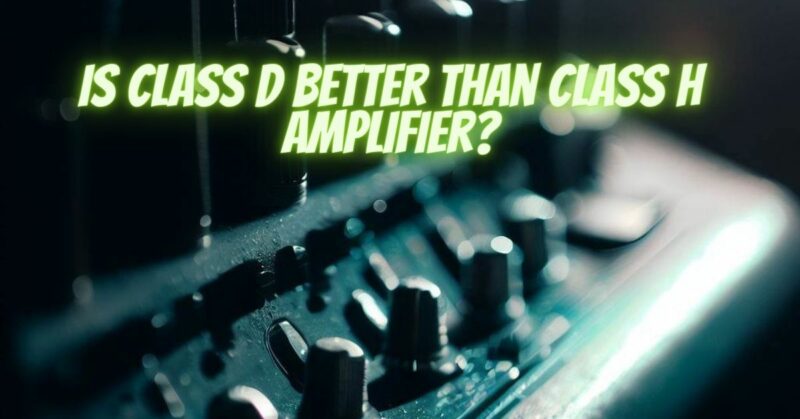The world of audio amplification is a realm of continuous innovation, with different amplifier classes designed to cater to diverse sonic requirements. When comparing Class D and Class H amplifiers, the question arises: Is Class D better than Class H? In this article, we’ll delve into the intricacies of both amplifier classes, exploring their features, benefits, and the scenarios in which each excels, helping you make an informed decision based on your specific needs.
Understanding Class D and Class H Amplifiers
Class D Amplifiers: Class D amplifiers are known for their high efficiency, making them suitable for a variety of applications, including audio systems and musical amplification. They utilize a pulse-width modulation (PWM) technique to convert the input signal into a series of on-off pulses. These pulses are then amplified using switching transistors, significantly reducing power loss and heat generation.
Class H Amplifiers: Class H amplifiers are designed to improve efficiency by adjusting the supply voltage based on the input signal’s amplitude. This dynamic voltage adjustment minimizes power wastage and enhances overall efficiency, making Class H amplifiers suitable for high-power applications.
Efficiency and Heat Dissipation
Class D: Class D amplifiers are renowned for their exceptional efficiency, often exceeding 90%. Their switching nature allows them to minimize power loss and heat generation. This efficiency makes them ideal for applications where power conservation and reduced heat dissipation are crucial.
Class H: Class H amplifiers also prioritize efficiency but achieve it through voltage rail modulation. By dynamically adjusting the supply voltage, Class H amplifiers optimize power usage. This technology helps reduce power consumption and heat generation, but their efficiency is generally slightly lower than that of Class D amplifiers.
Sound Quality
Class D: Modern Class D amplifiers have made significant advancements in sound quality. While early Class D designs were criticized for their sonic performance, newer models use advanced digital processing and feedback mechanisms to reduce distortion and improve sound accuracy. They are suitable for a wide range of applications, including musical amplification.
Class H: Class H amplifiers also offer respectable sound quality. However, the dynamic voltage adjustment mechanism may introduce some challenges related to signal integrity, especially during rapid changes in input signal amplitude. Careful design and engineering mitigate these issues to a significant extent.
Suitability for Different Applications
Class D:
- Portable Systems: Due to their efficiency and compact size, Class D amplifiers are often used in portable audio systems.
- Subwoofers: They are well-suited for driving subwoofers due to their ability to deliver high power efficiently.
- Home Audio: Class D amplifiers are increasingly being used in home audio systems, offering a balance between efficiency and sound quality.
Class H:
- Professional Audio: Class H amplifiers find applications in professional audio setups where high power is required, such as live sound reinforcement and large venues.
- Touring Systems: Their dynamic voltage adjustment makes them suitable for touring systems, as they can deliver high power efficiently without excessive heat generation.
The question of whether Class D is better than Class H depends on your specific needs and priorities. Both classes have their advantages, and each excels in different scenarios. If efficiency, compactness, and versatility are your priorities, Class D amplifiers might be a better fit. On the other hand, if you require high power efficiency for professional audio applications, especially those involving dynamic voltage variations, Class H amplifiers could offer distinct advantages. Ultimately, your choice should align with your intended use, desired features, and the sonic qualities that matter most to you.


